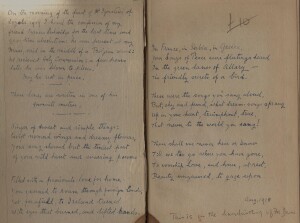 Inscribed on the inner board and flyleaf of a copy of the posthumously published collection Songs of Peace(1917) by the Irish poet and soldier Francis Ledwidge is this note and commemorative verse composed by Father Francis Charles Devas, the Jesuit chaplain of his battalion who had befriended him.
Inscribed on the inner board and flyleaf of a copy of the posthumously published collection Songs of Peace(1917) by the Irish poet and soldier Francis Ledwidge is this note and commemorative verse composed by Father Francis Charles Devas, the Jesuit chaplain of his battalion who had befriended him.
Corporal Ledwidge was just thirty years old when, ‘ on the morning of the feast of St Ignatius of Loyola’ ( in the words of Devas ) he was ‘ blown to bits ‘ by a German shell while sitting on a mud bank in a Belgian trench drinking a mug of tea with his mates in the 1stBattalion Royal Inniskilling Fusiliers. Just a few hours before, Devas had conducted Mass in a wood not far from the battlefield. Ledwidge was there and Devas had heard his confession, given him absolution and performed Holy Communion with him.
Back in London, Ledwidge’s publisher, Herbert Jenkins, who had brought out his debut collection, Songs of the Fieldstwo years earlier, were preparing Songs of Peacefor the press. It eventually appeared a few weeks following the poet’s death, with a Introduction by his great supporter in Ireland, Lord Dunsany, dated September 1916, in which he praised the simplicity of his protege’s verse, his yearning for Ireland and his courage in fighting for the cause of peace.
‘…this devotion to the fields of Meath that, in nearly all his songs, from such far places brings his spirit home, like the instinct that has been given o the swallows, seems to be the key-note of the book…’
Father Devas (1877 – 1951), one of nine children born to the distinguished political economist and Catholic theologian Charles Stanton Devas, entered the Society of Jesus at the age of eighteen and after graduating from Beaumont College, Old Windsor, went on to teach there and also in the Jesuit colleges in Wimbledon and Stamford Hill, before entering the army in 1914 as chaplain of the 1stRoyal Inniskillings Fusiliers. Here he saw action throughout Gallipoli and in France and Belgium, as his graphic diary entries show. Though he came out of the Great War largely unscathed, his younger brother, the Stonyhurst-educated Bertram, was killed at Ancre.
Devas’s verses on Ledwedge suggest that he felt the Irishman’s tragic death particularly keenly:
Singer of sweet and simple things:
Swift nomad wings and dreamy flowers,
Your song shewed but the tiniest part
Of your wild heart and warring powers.
Filled with a passionate love for home
You yearned to roam through foreign lands;
Yet, far afield, to Ireland turned
With eyes that burned, and lifted hands
In France, in Serbia, in Greece,
Your Songs of Peace were flutings heard
In the green lanes of Allary—
The friendly secrets of a bird.
These were the songs you sang aloud,
But, shy and proud, what dream-songs sprang
Up in your heart, triumphant, true,
That never to the world you sang!
These shall we never hear or know
Till we too go where you have gone,
To worship Love, and have, at rest,
Beauty unguessed, to gaze upon.
[R.M.Healey]
